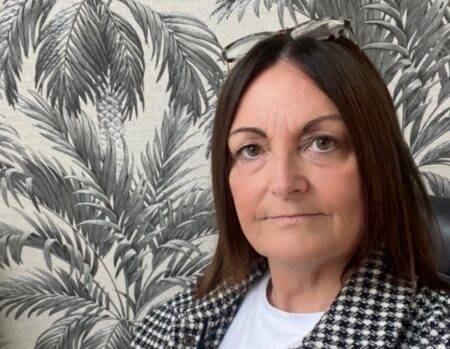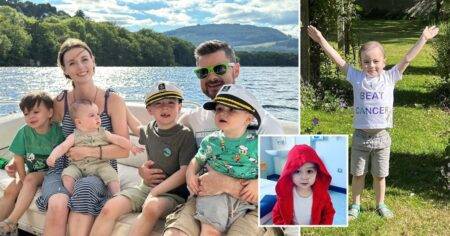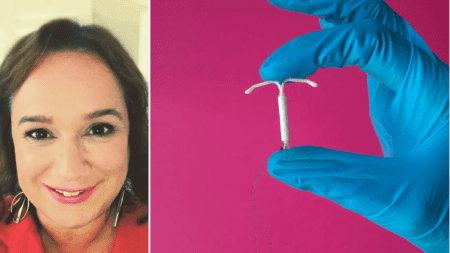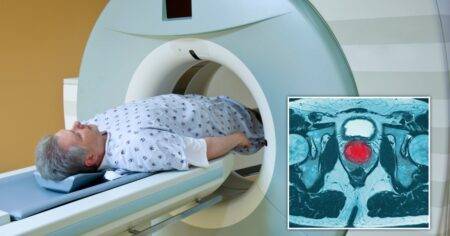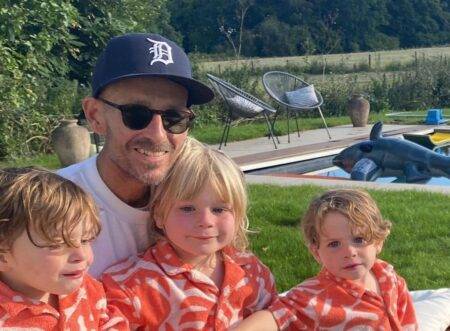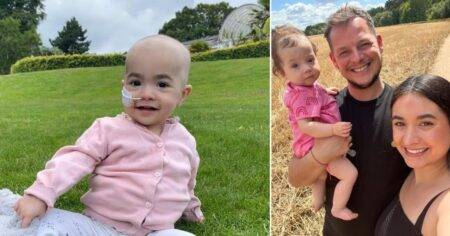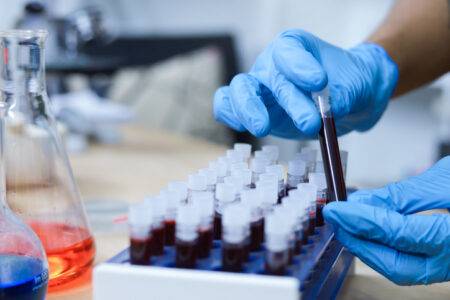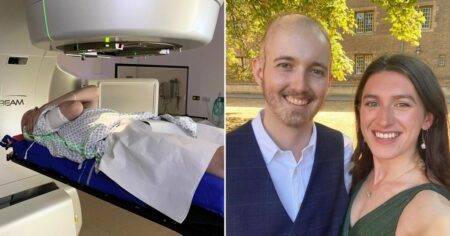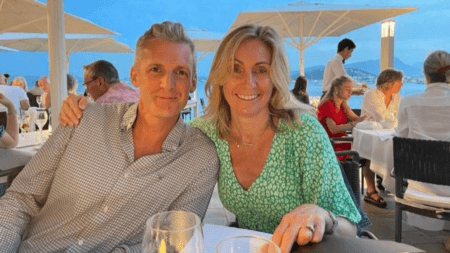The 58-year-old has an incurable form of blood cancer.
Browsing: Cancer
‘Instead of dwelling on his illness, Harry could focus his energy on something more positive.’
How could I have blanked something so important?
Thousands of people gathered in Skopje to protest outside the government (Picture: AP)
Cancer patients missed out on potentially life-saving treatment after healthcare workers sold their medications on the black market, it has been alleged.
Staff at a hospital in North Macedonia’s capital Skopje were blasted as ‘murderers’ during a demonstration outside the government quarters yesterday.
Attending were several people who said their relatives had died after being given placebos instead of proper chemotherapy because the drugs had been stolen.
‘My mother had breast cancer and her condition worsened a week after she was admitted to the clinic,’ one young man told the crowd.
To view this video please enable JavaScript, and consider upgrading to a web
browser that
supports HTML5
video
‘Unfortunately, she did not survive.’
The man, who did not give his name, described the hospital’s alleged behavior as ‘monstrous’.
Protesters covered their hands in red paint, signifying that those responsible have blood on their hands.
Eggs were hurled at the government building, and the crowd called for the urgent resignation of North Macedonia’s health minister and the hospital management.
A large sign reads ‘Killers for profit’ (Picture: Getty)
A woman paints with red paint on the asphalt (Picture: Getty)
Placards read ‘Killers for profit’ and ‘How many more deaths?’.
The scandal broke earlier this year after CCTV footage emerged showing a nurse allegedly smuggling cancer drugs out of the oncology building. They were later arrested.
A pre-investigation procedure was finally opened almost four months later, after Focus first reported about misuse of cancer medications.
On Friday, police raided the hospital and the homes of two staff members, seizing documents, computers and data drives.
Protesters throwing eggs and bottles at the government building in the capital (Picture: Getty)
Protesters remained at the square for hours (Picture: Getty)
But no further arrests were made and no charges have been filed.
Health minister Fatmir Mexhiti and hospital director Violeta Klisarova stressed that ‘patients are safe and there is no manipulation with the therapy’.
Klisarova said that since the nurse’s arrest protocols have been revised and access to cancer drugs has been restricted.
Meanwhile, Mexhiti vowed to do ‘everything in my power to clear up this case’.
Their promises fell on deaf ears as the public’s trust in health officials continues to decline.
President Stevo Pendarovski described the claims as ‘shocking and discussing’, adding that it was ‘high time to end the culture of impunity for serious crimes.
He said in a statement: ‘It is high time that the system confirms we are capable of dealing with severe forms of organized crime and corruption, and of ending the culture of impunity for serious violations of the laws.’
Get in touch with our news team by emailing us at webnews@metro.co.uk.
For more stories like this, check our news page.
‘This problem isn’t just financial, it’s emotional too.’
But mortality for some cancers is rising.
Linda says she became ‘fiercely protective’ of her daughters after they lost their dad.
Stainless steel straws are the better option.
The 10-minute scans are ‘more reliable’ than the current blood tests.
The radio star confirmed he has cancer this week.
Making precious family memories.
The family need to reach their £1 million target.
The drug is so new it doesn’t yet have a name. – Experimental drugs kick cancer into remission after all other treatments failed
Andrey Lugovoy has been wanted for murder by British police since the 2006 killing.
To view this video please enable JavaScript, and consider upgrading to a web
browser that
supports HTML5
video
Jonnie Irwin is taking on a major new project and has invited fans along to watch the process.
The TV star and father-of-three is a bit of a legend when it comes to property, having made his name on the likes of A Place In The Sun, The Renovation Game and Escape To The Country.
Jonnie, a father to three young kids, is currently going through a devastating terminal cancer diagnosis, saying last year that he could ‘have months to live,’ and has been offered love and support from fans ever since.
He keeps followers updated on his day-to-day life, from his health to his family to everything in between, via Instagram, and this week revealed he was tackling a major renovation.
Taking to the site, he shared a video of a crew working ont he front of a nondescript two-storey house, revealing it was taken on day one of renovating the front of the building.
Describing it as ‘not the prettiest of houses,’ Jonnie shared his vision of putting in differently-designed windows, ripping own the porch and moving the doorway to the centre of the house.
The TV star is taking on a major renovation project (Picture: Instagram / Jonnie Irwin)
He shared the progress so far as he admitted it was ‘early days’ yet (Picture: Instagram / Jonnie Irwin)
‘Doing so brings in a big room in the middle of the house. That makes it an entrance hall which is better to live in,’ the property expert explained.
He said it was ‘early days but pretty exciting.’
Alongside the video, Jonnie shared in the caption that he was ‘a couple of days late posting this but I promised to be honest with my posts about this renovation- warts n all.’
The TV star was praised by fans and followers for his ‘passion’ in taking on the massive project, with one saying his ‘ideas sound great…will look amazing.’
‘It’s going to be fabulous Jonnie, can’t wait to see the finished result,’ another said,’ while one declared: ‘Property is what you do best apart from being super dad of course.’
Fans praised him as having a fantastic eye for renovations as well as being a ‘super dad’ (Picture: Instagram / Jonnie Irwin)
Jonnie shares three young sons with wife Jessica (Picture: instagram.com/jonnieirwintv)
And one fan wrote kindly: ‘You are a superstar! Keep going, push on through, get your energy from our love, so many people around the world are sending you love and healing and prayers,’ one wrote.
The former A Place In The Sun presenter announced in November 2022 that he could have months to live after being diagnosed with terminal cancer, with the disease having spread from his lungs to his brain.
In sharing updates on his life both online and in interviews, Jonnie recently marked an emotional final milestone with one of the three young sons he shares with his wife Jessica Holmes, on the tot’s final day of nursery school
‘Last EVER ride to nursery with Rex. Suitably waved off by Rafa and his spade and Rex with his game face on!’ the doting dad shared on social media.
Jonnie shared a trio of photos from the moment to mark the occasion, which showed Rex on his little bike, kitted out in a cool Batman helmet and cycling gloves, with his dad behind him as they posed for a picture in the driveway.
Macmillan cancer support If you or someone you care about has been diagnosed with cancer, Macmillan can offer support and information.
You can contact their helpline on 0808 808 00 00 (7 days a week from 8am to 8pm), use their webchat service, or visit their site for more information.
MORE : Jonnie Irwin flooded with support as he suffers painful injury and shares photo of aftermath
MORE : Jonnie Irwin’s ‘last ever’ milestone with son Rex leaves fans in tears
The star revealed her diagnosis in May this year.
Such an incredible message.
It could potentially halve the screening workload.
The robot tentacle, which measures around 2 mm in diameter, can reach the smallest bronchial tubes in the lungs – unlike currently available technology.
Amy will not be involved in this year’s Strictly.
‘I can only say I am human and following a build-up of personal life pressure, I admit that I overreacted regarding the damage to my home.’
‘If I’ve got months to live, I want to try and make them the best I can.’
Paul announced his prostate cancer diagnosis at the beginning of the year.
‘I’m really well at the moment, but it is a ticking time bomb.’
Travel in the 1960s is causing health issues now.

